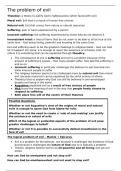The problem of evil
Theodicy: a theory to justify God’s righteousness (when faced with evil)
Moral evil: Evil that is a result of human free choices
Natural evil: Evil that comes from nature or natural resources
Suffering: pain or harm experienced by a person
Innocent suffering: the suffering experienced by those who do not deserve it
Inconsistent triad: a triad of items that do not seem to be able to all be true at the
same time – God being loving, powerful and knowing at the same time.
Evil and suffering seem to be the greatest challenge to religious belief – how can God
let it happen? For some, it is enough to reject the existence of a theistic God, for
others it is something that can be explained through theodicy.
The consequence of evil is suffering and evil is a problem because of the
amount of suffering it causes – how many people suffer, how bad the suffering is
and so on.
Innocent suffering in particular challenges the believer to ask how God can
allow innocent people to suffer
The religious believer seems to be challenged more by natural evil than moral
evil, because moral evil can be explained by the sinful actions of others.
Theodicy tries to explain why God can still be believed in and worshipped
despite evil being in the world.
Augustine explained evil as a result of free choices of people
Hick found the meaning of evil in the way that people freely choose to
respond to suffering
Both place free will at the centre of their theories
Possible Questions
Whether or not Augustine’s view of the origins of moral and natural
evils is enough to spare God from blame for evils
Whether or not the need to create a ‘vale of soul-making’ can justify
the existence or extent of evils
Which of the logical or evidential aspects of the problem of evil pose
greater challenges to belief?
Whether or not it is possible to successfully defend monotheism in the
face of evil
The logical problem of evil – Mackie + Epicurus
Evil is a problem for the believer, not because it challenges the existence of God
but because it challenges the nature of God and so is logically a problem.
Theistic religions believe God to be all-powerful and all-loving and yet evil
exists.
How can God be omnipotent and not stop evil?
How can God be omnibenevolent and not want to stop evil?
, He must know about it because he is omniscient!
Epicurus rejected the idea of a monotheistic God
This problem was stated by Epicurus – developed the inconsistent triad
In order for the inconsistent triad to be resolved, it seems that one of the three
parts must not be true – some resolutions disputing some of God’s
characteristics:
1. Perhaps God is not omnipotent and cannot control evil (or human free
choices) – this is the view of process theology
2. Perhaps God is not benevolent, and God’s benevolence is a view that has just
come from the New Testament focus on love. The Old Testament seems to show
God as fair, but brutal – for example, in the way God fights for the people of
Israel.
3. Perhaps our definitions of omnipotence and benevolence need to change
4. Perhaps evil does not exist as we think it does – it is not a substance like
goodness is.
Premise 1: Evil and suffering exist
Premise 2: God is all loving and all powerful
Premise 3: An all loving and all powerful God would remove evil and suffering
Weaknesses
This is a deductive argument as it concludes God must not exist – this is a
strength because it means if the premises of the argument are true, then the
conclusion is true, however id any premise is false, the argument fails.
The first premise of the logical problem of evil is that evil exists – you could
dispute this premise by arguing that evil doesn’t actually exist – Option 1:
rather, evil is just the absence of good, just as darkness is the absence of light
and not a thing in itself – so, if evil is simply am absence of good, it can be
argued to not exist at all, so the logical problem of evil collapses.
Option 2: Evil is a human illusion they are the names we give to situations
when our own greedy and selfish motives are not satisfied.
The second premise is that God is all loving and all powerful, however,
this also can be disputed - Theists such as Jews, Christians and Muslims
would agree with this statement. However, deists would disagree with this
description of him, as they believe in a non-personal God, so this being does not
have the characteristics like goodness or being loving, since these are qualities
only associated with the personal god. Also, some religions such as
Zoroastrianism (has a dualist view of the universe) believe God is not
omnipotent and therefore this can be a reason why God cannot remove evil.
The third premise is that an all loving and all powerful God would
remove evil and suffering – However, some would argue also that God has a
plan and he has a reason why he does not want to stop evil. Most commonly,
that through suffering, God can bring about some higher good. Furthermore,
some argue that God can simply cannot remove suffering, not because he is not
all-powerful, but because it is logically impossible. For example, trying to have a
world with good, but not evil is like trying to have a world with up but not down,
or light but not dark – it is simply impossible. Hick would argue that God’s love is
portrayed through evil – it allows us to develop our virtues




